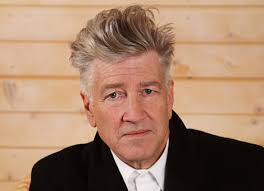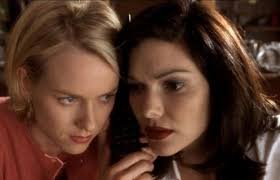David Lynch is an iconoclast. And if we're being honest, that's an understatement. Lynch doesn't really make movies so much as he makes surrealistic fever dreams populated by a world of bizarre characters and strange happenings. So it's inherent that his films will be difficult for some to understand, while those who do "get" them praise them to the heavens, hailing them as cinematic masterpieces.

I am squarely in the former group. To date, I've seen three Lynch films: The Elephant Man, Wild at Heart, and Mulholland Drive (which I've watched three times to date). And I can safely say that I don't really understand everything that's going on. What I have seen is that there seems to be a handful of prevalent themes that Lynch likes the work with. The most prominent of these themes is the de-romanticization of the world around us and the ideas that we hold dear.

The Elephant Man is by far the most straightforward of these films, but it still features classic Lynchian touches. Of course, the main character, John Merrick (played by John Hurt), is horrendously disfigured. Lynch implies, though, that Merrick's disfigurement is the result of industrialization, a process that was once idealized as the way of the future. Lynch shoots various industrial chimneys and machinery as harbingers of doom, spewing thick clouds of soot into the air and grinding away at humanity. He paints a picture of an industrial nightmare, and in Merrick he sees a representative at the ugliness that has overcome society as a result of industry. There are surreal moments, but for the most part, Lynch lets this story tell itself, resulting a film that's probably his most straightforward this side of The Straight Story (which I haven't seen, but considering it's a G-rated Disney movie, I doubt it features Lynch's typical nightmare surrealism).

If The Elephant Man shows the underside of industry, then Mulholland Drive exposes the dark underbelly of Hollywood. I think. This is a much more dense and abstract film, with a lot of various things going on at once and scenes/characters appearing and disappearing seemingly at random. As I've stated before, I've seen it three times, twice using Lynch's own tips for viewing, and I still haven't been able to completely make sense of it. But here's what I do know: Lynch has set his sights on de-glaming Hollywood, and he does so by mentally breaking down his main character, Betty, to the point where she may actually be two different people (?). As she's exposed to shady investigators and the bizzaro cabaret of Club Silencio, she becomes more and more broken, disillusioned by her previously hopeful dreams of making it in the movies. Those who understand it completely hail it as a masterpiece; I'm going to watch it a few more times, and hopefully I'll be able to crack the film.

Wild at Heart, his Palme d'Or winner, goes straight to the, well, heart, de-romanticizing romance itself. Nicolas Cage should appear in more Lynch films, because his unhinged nature is perfect for Lynch's dreamscapes. Here, he stars as a career criminal who's on the run with his love, going across country while being pursued by both hitmen and his girlfriend's parents. It's presented, initially, as a Bonnie & Clyde-esque fantasy, but as is typical for Lynch, he quickly dismembers the romantic notions with plenty of gruesome deaths and strange Wizard of Oz references. In Lynch's world, there's no room for a happily-ever-after, especially if you're going to live a life of crime.
And really, Lynch seems to be an anti-idealist, breaking down fantasy with fantasy to expose cold hard reality. Though his films are abstract surrealist experiences more than narratives, he's intent on showing us that what is dream and what is real are two very, very different things. It's been over five years since he's made a film, and he now seems more interested in music and coffee. One has to wonder if these new ventures will disabuse us of our optimism.
This is an entry in LAMBs in the Director's Chair.
I am squarely in the former group. To date, I've seen three Lynch films: The Elephant Man, Wild at Heart, and Mulholland Drive (which I've watched three times to date). And I can safely say that I don't really understand everything that's going on. What I have seen is that there seems to be a handful of prevalent themes that Lynch likes the work with. The most prominent of these themes is the de-romanticization of the world around us and the ideas that we hold dear.
The Elephant Man is by far the most straightforward of these films, but it still features classic Lynchian touches. Of course, the main character, John Merrick (played by John Hurt), is horrendously disfigured. Lynch implies, though, that Merrick's disfigurement is the result of industrialization, a process that was once idealized as the way of the future. Lynch shoots various industrial chimneys and machinery as harbingers of doom, spewing thick clouds of soot into the air and grinding away at humanity. He paints a picture of an industrial nightmare, and in Merrick he sees a representative at the ugliness that has overcome society as a result of industry. There are surreal moments, but for the most part, Lynch lets this story tell itself, resulting a film that's probably his most straightforward this side of The Straight Story (which I haven't seen, but considering it's a G-rated Disney movie, I doubt it features Lynch's typical nightmare surrealism).
If The Elephant Man shows the underside of industry, then Mulholland Drive exposes the dark underbelly of Hollywood. I think. This is a much more dense and abstract film, with a lot of various things going on at once and scenes/characters appearing and disappearing seemingly at random. As I've stated before, I've seen it three times, twice using Lynch's own tips for viewing, and I still haven't been able to completely make sense of it. But here's what I do know: Lynch has set his sights on de-glaming Hollywood, and he does so by mentally breaking down his main character, Betty, to the point where she may actually be two different people (?). As she's exposed to shady investigators and the bizzaro cabaret of Club Silencio, she becomes more and more broken, disillusioned by her previously hopeful dreams of making it in the movies. Those who understand it completely hail it as a masterpiece; I'm going to watch it a few more times, and hopefully I'll be able to crack the film.
Wild at Heart, his Palme d'Or winner, goes straight to the, well, heart, de-romanticizing romance itself. Nicolas Cage should appear in more Lynch films, because his unhinged nature is perfect for Lynch's dreamscapes. Here, he stars as a career criminal who's on the run with his love, going across country while being pursued by both hitmen and his girlfriend's parents. It's presented, initially, as a Bonnie & Clyde-esque fantasy, but as is typical for Lynch, he quickly dismembers the romantic notions with plenty of gruesome deaths and strange Wizard of Oz references. In Lynch's world, there's no room for a happily-ever-after, especially if you're going to live a life of crime.
And really, Lynch seems to be an anti-idealist, breaking down fantasy with fantasy to expose cold hard reality. Though his films are abstract surrealist experiences more than narratives, he's intent on showing us that what is dream and what is real are two very, very different things. It's been over five years since he's made a film, and he now seems more interested in music and coffee. One has to wonder if these new ventures will disabuse us of our optimism.
This is an entry in LAMBs in the Director's Chair.
Comments